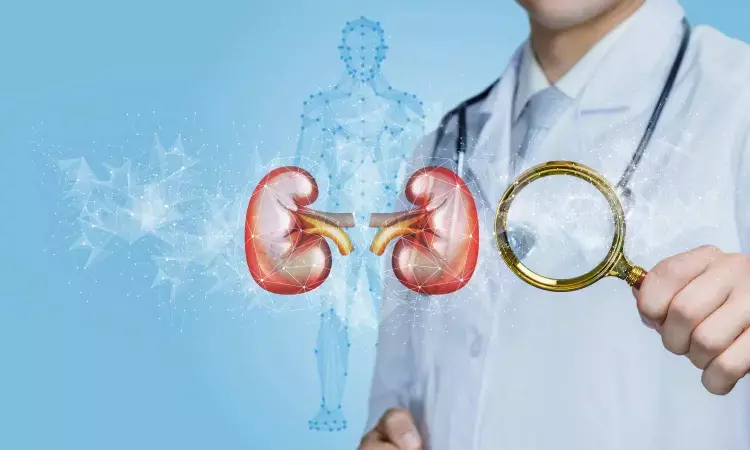- Home
- Medical news & Guidelines
- Anesthesiology
- Cardiology and CTVS
- Critical Care
- Dentistry
- Dermatology
- Diabetes and Endocrinology
- ENT
- Gastroenterology
- Medicine
- Nephrology
- Neurology
- Obstretics-Gynaecology
- Oncology
- Ophthalmology
- Orthopaedics
- Pediatrics-Neonatology
- Psychiatry
- Pulmonology
- Radiology
- Surgery
- Urology
- Laboratory Medicine
- Diet
- Nursing
- Paramedical
- Physiotherapy
- Health news
- Fact Check
- Bone Health Fact Check
- Brain Health Fact Check
- Cancer Related Fact Check
- Child Care Fact Check
- Dental and oral health fact check
- Diabetes and metabolic health fact check
- Diet and Nutrition Fact Check
- Eye and ENT Care Fact Check
- Fitness fact check
- Gut health fact check
- Heart health fact check
- Kidney health fact check
- Medical education fact check
- Men's health fact check
- Respiratory fact check
- Skin and hair care fact check
- Vaccine and Immunization fact check
- Women's health fact check
- AYUSH
- State News
- Andaman and Nicobar Islands
- Andhra Pradesh
- Arunachal Pradesh
- Assam
- Bihar
- Chandigarh
- Chattisgarh
- Dadra and Nagar Haveli
- Daman and Diu
- Delhi
- Goa
- Gujarat
- Haryana
- Himachal Pradesh
- Jammu & Kashmir
- Jharkhand
- Karnataka
- Kerala
- Ladakh
- Lakshadweep
- Madhya Pradesh
- Maharashtra
- Manipur
- Meghalaya
- Mizoram
- Nagaland
- Odisha
- Puducherry
- Punjab
- Rajasthan
- Sikkim
- Tamil Nadu
- Telangana
- Tripura
- Uttar Pradesh
- Uttrakhand
- West Bengal
- Medical Education
- Industry
Higher dietary intake of plant protein is tied to lower risk of chronic kidney disease

South Korea: Greater intake of dietary plant protein was shown to be associated with a lower risk of incident chronic kidney disease (CKD) in a large, prospective cohort study published in the American Journal of Kidney Diseases.
Plant-based diets confer various health benefits, including lowering the risk of cardiovascular disease and certain cancers. However, the relationship between plant protein intake and the risk of chronic kidney disease (CKD) remains unclear. This study led by Ga Young Heo aimed to investigate the association between plant protein intake and the development of CKD.
The study included 117,809 participants who completed more than one dietary questionnaire and had an eGFR (estimated glomerular filtration rate) ≥60 ml/min/1.73 m2, a urinary albumin-to-creatinine ratio (UACR) <30 mg/g, and no history of CKD.
Key findings include:
· During a median follow-up of 9.9 years, incident CKD occurred in 3.2% of participants (incidence rate, 3.2 per 1,000 person-years). In a multivariable model, the adjusted hazard ratios (aHRs for the second, third, and highest quartiles of plant protein intake were 0.90, 0.83, and 0.82, respectively, compared with the lowest quartile.
· Modeled as a continuous variable, the aHR per 0.1 g/kg/day plant protein intake increase was 0.96. This beneficial association was also consistent in secondary analyses for which CKD was defined based on codes or two consecutive measures of eGFR <60 ml/min/1.73 m2, or on UACR >30 mg/g.
· Various sensitivity analyses demonstrated consistent findings.
Using the UK biobank study data, the researchers found that participants with a higher plant protein intake had a lower risk of developing CKD. This finding suggests that a higher dietary intake of plant-based protein may be beneficial for kidney health and provide insight into dietary interventions to prevent CKD in primary care settings.
Reference:
Ga Young Heo, Hyo Jeong Kim, Kyung Won Kim, Chan-Young Jung, Hyung Woo Kim, Tae Ik Chang, Jung Tak Park, Tae-Hyun Yoo, Shin-Wook Kang, Seung Hyeok Han, Association of Plant Protein Intake With Risk of Incident CKD: A UK Biobank Study, DOI:https://doi.org/10.1053/j.ajkd.2023.05.007
Dr Kamal Kant Kohli-MBBS, DTCD- a chest specialist with more than 30 years of practice and a flair for writing clinical articles, Dr Kamal Kant Kohli joined Medical Dialogues as a Chief Editor of Medical News. Besides writing articles, as an editor, he proofreads and verifies all the medical content published on Medical Dialogues including those coming from journals, studies,medical conferences,guidelines etc. Email: drkohli@medicaldialogues.in. Contact no. 011-43720751


